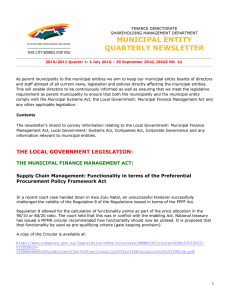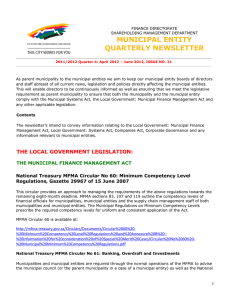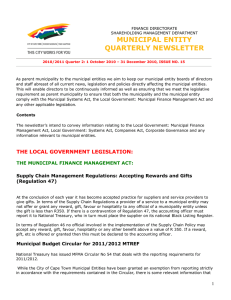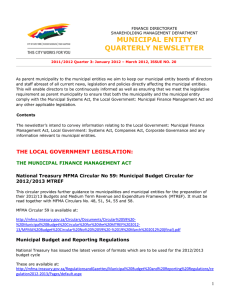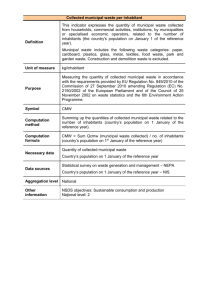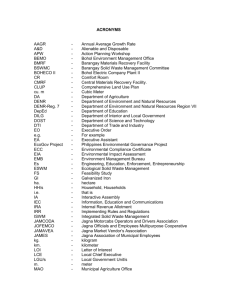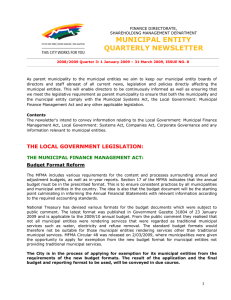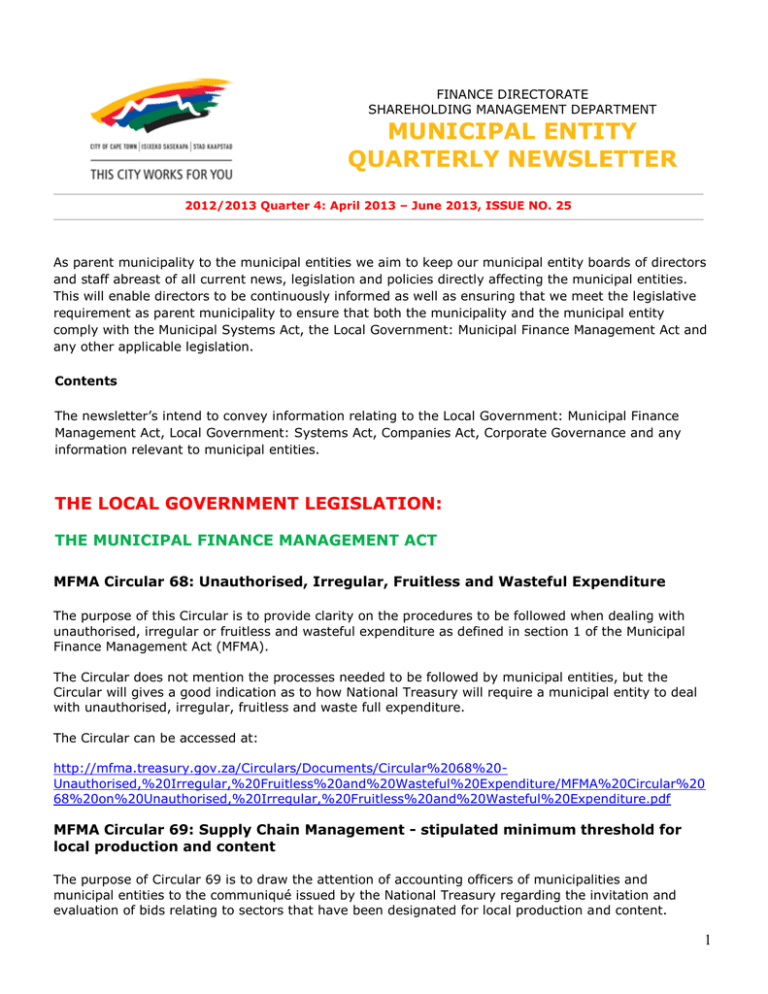
FINANCE DIRECTORATE
SHAREHOLDING MANAGEMENT DEPARTMENT
MUNICIPAL ENTITY
QUARTERLY NEWSLETTER
Analyst
2012/2013 Quarter 4: April 2013 – June 2013, ISSUE NO. 25
As parent municipality to the municipal entities we aim to keep our municipal entity boards of directors
and staff abreast of all current news, legislation and policies directly affecting the municipal entities.
This will enable directors to be continuously informed as well as ensuring that we meet the legislative
requirement as parent municipality to ensure that both the municipality and the municipal entity
comply with the Municipal Systems Act, the Local Government: Municipal Finance Management Act and
any other applicable legislation.
Contents
The newsletter’s intend to convey information relating to the Local Government: Municipal Finance
Management Act, Local Government: Systems Act, Companies Act, Corporate Governance and any
information relevant to municipal entities.
THE LOCAL GOVERNMENT LEGISLATION:
THE MUNICIPAL FINANCE MANAGEMENT ACT
MFMA Circular 68: Unauthorised, Irregular, Fruitless and Wasteful Expenditure
The purpose of this Circular is to provide clarity on the procedures to be followed when dealing with
unauthorised, irregular or fruitless and wasteful expenditure as defined in section 1 of the Municipal
Finance Management Act (MFMA).
The Circular does not mention the processes needed to be followed by municipal entities, but the
Circular will gives a good indication as to how National Treasury will require a municipal entity to deal
with unauthorised, irregular, fruitless and waste full expenditure.
The Circular can be accessed at:
http://mfma.treasury.gov.za/Circulars/Documents/Circular%2068%20Unauthorised,%20Irregular,%20Fruitless%20and%20Wasteful%20Expenditure/MFMA%20Circular%20
68%20on%20Unauthorised,%20Irregular,%20Fruitless%20and%20Wasteful%20Expenditure.pdf
MFMA Circular 69: Supply Chain Management - stipulated minimum threshold for
local production and content
The purpose of Circular 69 is to draw the attention of accounting officers of municipalities and
municipal entities to the communiqué issued by the National Treasury regarding the invitation and
evaluation of bids relating to sectors that have been designated for local production and content.
1
Regulation 9(1) of the Preferential Procurement Regulations, 2011 makes provision for the Department
of Trade and Industry to designate sectors where in the award of bids, local production and content is
of critical importance. Such bids must be advertised with a specific condition that only locally produced
goods, works or services or locally manufactured goods with a stipulated minimum threshold for local
production and content will be considered.
The Circular can be accessed at:
http://mfma.treasury.gov.za/Circulars/Documents/Circular%2069%20–
%20%20SCM%20on%20Local%20Production%20and%20Content/SCM%20Circular%20Local%20Prod
uction%20and%20Content.pdf
APPLICATION OF THE GRAP REPORTING FRAMEWORK
The Accountant-General has issued a document to outline and provide guidance on selected issues
relating to the GRAP Reporting Framework for financial years ending 30 June 2013. The prescripts of
the document apply to municipalities and municipal entities.
Directive 5 on Determining the GRAP Reporting Framework outlines the list of standards and other
pronouncements that should be applied by entities in preparing their financial statements. The
appendices to Directive 5 outline the specific Standards and pronouncements to be applied by entities
for a particular reporting period.
In certain instances, entities are allowed to choose between the application of an IFRS, an IPSAS, or a
Standard of GRAP which is not yet effective. This document guides entities in making such a decision in
respect of the following:
Related Parties
http://oag.treasury.gov.za/Publications/01.%20Annual%20Financial%20Statements/05.%20For%20Lo
cal%20Government/For%20fin.%20year%20ending%2030-062013/Application%20of%20the%20GRAP%20reporting%20framework%20-%20MFMA%202012-13.pdf
GENERAL:
PWC’s NextGen: A global generational study
Millennial Workers Want Greater Flexibility, Work/Life Balance, Global
Opportunities
“This comprehensive and global generational study conducted by PwC, the University of Southern
California and the London Business School looks into the aspirations, work styles and values of
“Millennial”/”Generation Y” employees (those born between 1980 and 1995).
The study, which included more than 40,000 responses from Millennials and non-Millennials alike,
captures the various forces at play that are influencing the experience of Millennials. These include:
workplace culture, communication and work styles, compensation and career structure, career
development and opportunities and work/life balance.”
http://www.pwc.com/gx/en/hr-management-services/publications/nextgenstudy.jhtml?WT.mc_id=0515-nextgen_gx+ghp
2
PWC’s Public Sector Research Centre: “Future of Government – Tomorrow’s
leading public body”
“Government and public sector organisations world-wide must adjust to the new reality of ‘doing more
for less’ (or ‘doing less for less’) and focus on the outcomes society needs and wants. Public bodies
must also decide if they want to consume the legacy left behind by predecessors, or create a new
legacy for the next generation.”
PwC’s Public Sector Research Centre has compiled a report on how it sees the future of government.
http://www.pwc.com/gx/en/psrc/publications/future-of-government.jhtml
Africa attractiveness survey 2013
Getting down to business – Ernst and Young
“Africa’s rise over the past decade has been very real. While sceptics still abound, and there are people
who still seek to debate the point, the evidence of the continent’s clear progress over the past decade
is irrefutable.
Over this period, a critical mass of African economies have grown at high and sustained rates; so much
so that, despite the impact of the on-going global economic situation, the size of the African economy
has more than tripled since 2000. The outlook also appears positive, with many parts of the region
forecast to continue experiencing relatively high growth rates and a number of African economies
predicted to remain among the fastest growing in the world for the foreseeable future.”
http://www.ey.com/ZA/en/Issues/Business-environment/Africa-Attractiveness-Survey
Please contact Louise Muller (021 4003940) or Richard Wootton (021 4002701) if you have any queries
in respect of this newsletter.
Although every effort is made to check the accuracy and quality of the information supplied, The City
cannot be held responsible for any errors that may arise.
Copyright: City of Cape Town 2012. All rights reserved. No part of this newsletter may be reproduced or transmitted in any form without
written permission from the City of Cape Town, Finance Directorate, Shareholding Management Department.
3

